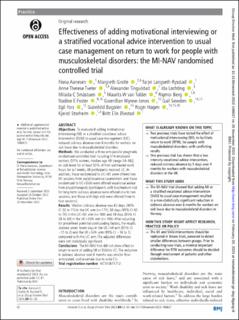Effectiveness of adding motivational interviewing or a stratified vocational advice intervention to usual case management on return to work for people with musculoskeletal disorders: The MI-NAV randomised controlled trial
Aanesen, Fiona; Grotle, Margreth; Rysstad, Tarjei Langseth; Tveter, Anne Therese; Tingulstad, Alexander; Løchting, Ida; Småstuen, Milada Cvancarova; van Tulder, Maurits W.; Berg, Rigmor; Foster, Nadine E.; Wynne-Jones, Gwenllian; Sowden, Gail; Fors, Egil Andreas; Bagøien, Gunnhild Irene; Hagen, Roger; Storheim, Kjersti; Øiestad, Britt Elin
Peer reviewed, Journal article
Published version
Permanent lenke
https://hdl.handle.net/11250/3053261Utgivelsesdato
2022Metadata
Vis full innførselSamlinger
- Artikler [5068]
- Publikasjoner fra CRIStin FHI [7544]
Originalversjon
Occupational and Environmental Medicine. 2022, 80 (1), 42-50. 10.1136/oemed-2022-108637Sammendrag
Objectives: To evaluate if adding motivational interviewing (MI) or a stratified vocational advice intervention (SVAI) to usual case management (UC), reduced sickness absence over 6 months for workers on sick leave due to musculoskeletal disorders. Methods: We conducted a three-arm parallel pragmatic randomised controlled trial including 514 employed workers (57% women, median age 49 (range 24–66)), on sick leave for at least 50% of their contracted work hours for ≥7 weeks. All participants received UC. In addition, those randomised to UC+MI were offered two MI sessions from social insurance caseworkers and those randomised to UC+SVAI were offered vocational advice from physiotherapists (participants with low/medium-risk for long-term sickness absence were offered one to two sessions, and those with high-risk were offered three to four sessions). Results: Median sickness absence was 62 days, (95% CI 52 to 71) in the UC arm (n=171), 56 days (95% CI 43 to 70) in the UC+MI arm (n=169) and 49 days (95% CI 38 to 60) in the UC+SVAI arm (n=169). After adjusting for predefined potential confounding factors, the results showed seven fewer days in the UC+MI arm (95% CI −15 to 2) and the UC+SVAI arm (95% CI −16 to 1), compared with the UC arm. The adjusted differences were not statistically significant. Conclusions: The MI-NAV trial did not show effect on return to work of adding MI or SVAI to UC. The reduction in sickness absence over 6 months was smaller than anticipated, and uncertain due to wide CIs. Effectiveness of adding motivational interviewing or a stratified vocational advice intervention to usual case management on return to work for people with musculoskeletal disorders: The MI-NAV randomised controlled trial
